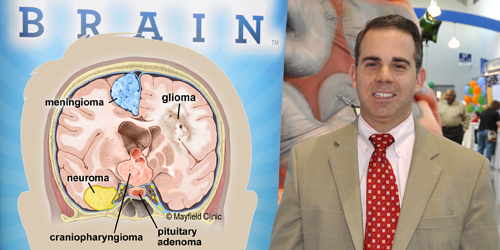
By Christopher McPherson, MD
When the diagnosis is a brain tumor, we need to consider all the options. The big four comprise surgery, radiation, chemotherapy, and immunotherapy. A lesser-known treatment that can be an effective option in select cases involves cesium implants.
Cesium implants, also known as brachytherapy, are tiny radioactive seeds about the size of grains of rice that we place inside a tumor cavity. The radiation, sealed within titanium casings, damages DNA in the tumor cells before dissipating over time. While the implants provide a lethal dose to nearby tumor cells, their range is small enough that they do little damage to healthy tissues.
Recently we transitioned from using iodine-125 implants to cesium-131 implants. Because the half-life of cesium-131 is 10 days, versus 60 days for iodine-125, patients and families are exposed to radiation for a much shorter period of time. The implants eventually become dormant and are left in the brain cavity permanently.
We use these implants primarily for metastatic brain tumors in patients whose cancer has returned after radiosurgery. These patients, who have failed radiosurgery, are not likely to benefit from an additional course. Cesium-131 implants offer a different route, delivering 95 percent local control and almost no symptomatic radiation necrosis.
We are also using these implants in the treatment of some patients with recurrent glioblastoma, the aggressive brain cancer.
In a significant, practical improvement, the new implants come aligned on a string, allowing us to easily place them, equally spaced, in the tumor resection cavity. Previously, we implanted iodine-125 seeds one at a time, spacing them to the best of our abilities. The new design allows for a more uniform delivery of radiation.
As someone who has made a special commitment to the battle against brain tumors, I want to ensure that my colleagues and I are well-versed in every option available to our patients. Although cesium-131 implants are not frequently used, they are an important weapon in our arsenal.
*****
Christopher McPherson, MD, is a neurosurgeon with Mayfield Brain & Spine and Site Director of Neurosurgery at Good Samaritan Hospital.